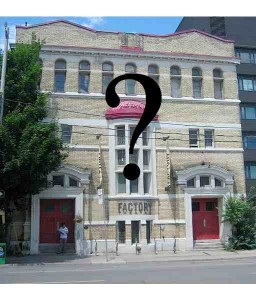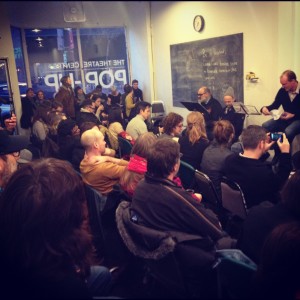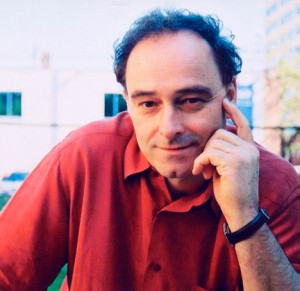
by Aislinn Rose
Last year, after the firing of Ken Gass from Factory Theatre, David Ferry and I exchanged open letters on this site. David’s letter, addressed to the younger generation of theatre artists, first appeared on Facebook. He asked why the newer generation of artists was so silent on the issue. Was it apathy? Had he and his contemporaries failed the next generation by not setting a good example?
“How have I and my contemporaries failed in setting an example for you, so that you do not feel compelled to speak up in such a time?
Why do we as a community of artists have so little to say politically about our own institutions in comparison to similar communities from other cultures… USA, Britain, France, Germany as well as the non-Eurocentric communities of theatre artists in the world?”
I responded by saying I felt the issue was larger than the firing of one Artistic Director, and that an assumption could not be made that silence on one point was an indication of apathy on all points. I talked about this generation’s participation in Toronto’s Culture Consultations, about our work with TAPA & Arts Action Research’s Theatres Leading Change, about the Indie Caucus and our ongoing struggles to bring necessary changes to an important but outdated institution that is the Canadian Actors’ Equity Association, and more.
“This is not apathy, but a quiet community of passionate and dedicated artists working away at changing what no longer works. I am not silent, I sit on no fence, and I am not complicit. I’m just offering my voice to a different fight.”
While it was clear that neither of us was going to suggest the firing had been handled well, we certainly had come out on opposite ends of the spectrum in terms of what the response to the situation should be.
What was most compelling was the intense, articulate, and passionate debate that appeared in the comments sections of these posts. Across generations most commenters were willing to sign their names to their ideas and opinions. It became clear the greatest value to be derived from our disparate viewpoints was the space that was created between the two, allowing for discussion on all the murkiness and grey in between.
On Monday, April 1st, we’re bringing this discussion into a physical space and we’re asking our community to join us in that murkiness. The debate structure we’ve chosen, based on the Canadian parliamentary model, requires a bold, clear statement, allowing for our incredible speakers to address their opposing viewpoints with passion and rigour:
Be it resolved that Boards of Directors have the right and responsibility to overrule the Artistic Direction of a theatre company.
I want to be very clear about the nature of the discussion I hope this debate will engender. This is a complicated issue, and there is much to be learned on the topic. As a result, I feel I can’t say this enough: we are not coming together to argue. We are coming together to listen, consider and respond.
As we’ve mentioned in previous posts about Civil Debates, “just like the best acting, each debater should have a responsibility to hear the arguments that come before them and respond – not just deliver a prepared statement.” Our goal is to address more than the firing of one artistic director, or one theatre, or events in one city. We’re addressing larger issues, the results of which could be seen in theatres across this country over the last few years.
Join us on Monday for this important and spirited discussion. I hope you will come with an open mind, a willingness to listen and learn, and even just the slightest chance that someone on this panel might change your mind, regardless of the perspective you came in with.
CIVIL DEBATES
Debate 2: Arts Boards
Hosted by Theatre Centre Managing Director Roxanne Duncan
Moderated by Praxis Theatre Artistic Producer Aislinn Rose
Debaters Franco Boni, Brendan Healy, Gideon Arthurs and Jini Stolk
April 1, 2013; doors 7pm, debates 7.30pm
The Theatre Centre Pop-Up, 1095 Queen St. West, at Dovercourt
PWYC at the door.
Twitter Hashtag: #CivilDebates
Click here for more information about the Civil Debates series in partnership between The Theatre Centre & Praxis Theatre.
]]>

Last week traffic to praxistheatre.com exploded when we re-published David Ferry’s Facebook letter asking the under thirty-five set why they were not outraged by the firing of Ken Gass as Artistic Director at Factory Theatre.
When Praxis Artistic Producer Aislinn Rose responded with a letter of her own, this went to a whole new level, with more people coming to the site in one day than saw all three of the shows we presented in 2011 combined.
The pieces, as well as the intelligent and thoughtful comments that followed them have motivated a few responses on the internet:
* Producer and marketer Sue Edworthy put together a Wordle for all four of the major notes written on the subject including Facebook notes by Chris Coculuzzi and Lisa Norton.
* U of T theatre prof Holger Syme related the conversation to some observations he has had on Toronto theatre lately. The two big ones: 1)Where are the young people on our stages? 2) Where is our classical work outside of Stratford and Shaw?
* Director and Artistic Director Jacob Zimmer used the Small Wooden Shoe blog to reference this conversation and also apply for the position of Factory Theatre Artistic Director. One condition: The Board of Directors must resign by the end of the year.
* A number of prominent artists are calling for a boycott of The Factory Theatre. They have set up a website: savethefactory.ca which outlines why. In reference to artists boycotting the theatre’s season, Ken Gass had this to say in the comments of a recent Torontoist article on the story:
]]>I just want to make clear, I would NEVER ask artists to pull their work from the season, no matter who is running the theatre. […] there are many arenas of protest other than ones that will impact on the financial welfare of artists.
I have seen several letters from some extraordinary artists that offer actions or pathways forward in response to the Board of Factory actions, and have contributed my own modest thoughts to the debate.
One of the things that alarms me is the relative absence of voices from the younger generation of theatre artists…ADs of project centric companies, authors, actors, dramaturgs, designers,producers.
 Not to generalize too much, but I have seen very few signatures on the various letters seeking either extreme, moderate or conciliatory activity…in fact very little commentary at all from the majority of Toronto theatre artists under the age of, say, 35. Perhaps many signed the initial petition that garnered 3000+ signatures, but where are the voices NOW?
Not to generalize too much, but I have seen very few signatures on the various letters seeking either extreme, moderate or conciliatory activity…in fact very little commentary at all from the majority of Toronto theatre artists under the age of, say, 35. Perhaps many signed the initial petition that garnered 3000+ signatures, but where are the voices NOW?
I am not suggesting that the younger voices need to agree with Mr. Healey, Mr Walker, Mr. Moodie, Ms Stolk or Ms Gibson MacDonald and their various suggestions for action..but I am suggesting that perhaps more than any other group, you have a vital stake in what is happening and you need to express your opinions.
I ask myself a few questions here:
Why is there such relative silence from your generations of theatre artists?
How have I and my contemporaries failed in setting an example for you, so that you do not feel compelled to speak up in such a time?
Why do we as a community of artists have so little to say politically about our own institutions in comparison to similar communities from other cultures..USA, Britain, France, Germany as well as the non-Eurocentric communities of theatre artists in the world?
Others of my generation of Canadian theatre artists have suggested that you are simply waiting, like Prince Charles for the old guard to slip away so you can take over the institutions that have been built.
Some have suggested that you live in fear of rocking the boat and so not getting hired by whoever does take over theatres such as Factory.
Some say you are just rigid with apathy about the issues that have challenged Canadian theatre artists from the beginning of our short professional theatre history. We are after-all, for all practical purposes, just 70 years old as a theatre culture.
But I have worked with many of you, and I have sensed a fierce intelligence and passion inside you. So your silence I know is not simply due to the above.
Is it that you don’t feel these issues are YOUR issues?
Because, I believe they are. The real issues at hand here are the issues of artist voice and artists’ moral rights to have a say in how the theatres that live or die by our work as artists are run. The issue of Board control over artists and their institutions has been a challenge to our Theatre since the first professional regional theatres were born out of the ashes of amateur theatre and throughout the evolution of large regionals, the alternative movements of the 70s and early 80s and the new wave theatres of the 90s and beyond. T
The issue is far larger than the firing of one AD (one, I might add, that has had a major impact on many of your careers…it was not after all the board of Factory that gave you a break when you needed it was it?) The issue is one of ownership of voice through the determination of how our institutions are run. If you do not speak out on this issue (and again, I care not what side you may come from, I ask only that you speak) you are in danger of backing yourselves into a corner of irrelevance.
When Sara Kane’s play “Blasted” was first produced in England, it received some pretty vicious press. The major artists of various ages in England were quick to respond through a very vocal and activist series of letters to editors, op-ed articles and broadcast debates. Many of the senior “established” artists such as Carol Churchill, Harold Pinter and many more went to the barricades to fight for creative voice. This has happened in England, the US, France, Germany (as I mentioned earlier) again and again when artists and their institutions are attacked.
Why are we so complacent here?
Why are you being so silent?
The blogs and papers and theatre lobbies should be abuzz with thoughts, opinions, letters from YOU (DOB 1977 and beyond)..yet I sense in sad recognition that the issue is slipping so quickly to just another Facebook entry-du-jour.
Please do not let that happen. Please do not be silent. Theatres like Factory were built with the blood, sweat and tears (and physical/mental/spiritual currency) of your predecessors in our community. They were not built to be passed on to board membership after board membership for patriarchal stewardship. They were built to be passed on to you! And when I see with wonder the explosion of new babies in your circles, it bears remarking that what you inherit, you will too pass on to them.
But Goddamn it, you have to stand up to be counted first. You have to get off the fence. You have to speak. All silence is the silence of complicity in your own future being determined by others.
With respect, solidarity and hope.
David Ferry
]]>
by Mitchell Cushman
In his best-selling biography of Steve Jobs, Walter Isaacson details at length the Apple founder’s infamous reality distortion field—his ability to “bend any fact to fit the purpose at hand”. Isaacson recounts how Jobs used this knack for re-purposing the truth in order to dream up seemingly impossible products, but also as a way of restructuring past experiences in a way that best suited whatever current narrative he was in the process of spinning. In this way as in others, Steve Jobs was a storyteller—a practitioner of theatre. And over the past two weeks, we have received a powerful reminder that monologuist Mike Daisey, creator of the play The Agony and the Ecstasy of Steve Jobs, is as well.
As new evidence has shown, Daisey has been employing his own reality distortion field, and has bent many a fact to fit his purpose. (I won’t list the embellishments here, but they have been everywhere in the news; for those interested, I would highly recommend listening to the March 16 episode of This American Life, “Retraction”). For Daisey, the purpose at hand has been inspiring North Americans into demanding better labour conditions at the Chinese factories that manufacture our various electronics. And to this end, Daisey has achieved a real measure of success. The New York Times and many other major news organizations have taken up the fight and Apple’s Foxconn factory has become a household name. In response to these pressures Apple and Foxconn announced this past week, in a landmark admission of corporate culpability, that they will be implementing a massive overhaul of their labour practices, hiring more workers, eliminating illegal overtime and substantially improving the safety protocols in the factory. A direct line can be drawn between the growing profile of Daisey’s play, and the attention surrounding its cause.
 Daisey’s ill-advised foray into journalistic territory—adapting his play for This American Life, appearing on various news outlets—has clouded the fact that he began by creating Agony as a piece of theatre, an art form in which invention is not only permissible, but kind of the point. When we attend a play, we are willingly offering ourselves up to be taken in, to suspend our disbelief, in order that we might connect to some underlying truth. This is exactly what Agony has done for its audiences. As host Ira Glass pinpointed during Daisey’s first appearance on This American Life a few months back, Daisey has done something “really kind amazing”, namely make people newly question an unjust system which on some level most of us have come to accept. “Which,” as Glass maintains “is really quite a trick, you really have to know how to tell a story to be able to pull something like that off.”
Daisey’s ill-advised foray into journalistic territory—adapting his play for This American Life, appearing on various news outlets—has clouded the fact that he began by creating Agony as a piece of theatre, an art form in which invention is not only permissible, but kind of the point. When we attend a play, we are willingly offering ourselves up to be taken in, to suspend our disbelief, in order that we might connect to some underlying truth. This is exactly what Agony has done for its audiences. As host Ira Glass pinpointed during Daisey’s first appearance on This American Life a few months back, Daisey has done something “really kind amazing”, namely make people newly question an unjust system which on some level most of us have come to accept. “Which,” as Glass maintains “is really quite a trick, you really have to know how to tell a story to be able to pull something like that off.”
Knowing how to tell a story means something very different in the theatre than it does in journalism. Daisey has publicly regretted and apologized for his conflation of the two, and any damage that this may have caused, either to the cause or to the journalistic organizations whom he let take his words as fact. The uncomfortable question to consider is, had Daisey not included these fabrications, had his show just rested on the staggering statistics documenting the inhuman working conditions, without any of the what we now know to be the theatricalized moments, without the disfigured line worker apocryphally calling Daisey’s iPad “magic” or without the imagined gun-toting factory guards, would the same call to action have resulted? Would Apple and Foxconn have been driven to publicly vow to do better? Or would we all simply have tuned out these numbers, and relegated them to the statistical scrapheap in the back of our minds? Is this an instance where theatrical storytelling, more so than journalistic reporting, has been necessary in order to prompt change?
We’re interested in examining these questions, and so we will be continuing forward with our upcoming production of The Agony and the Ecstasy of Steve Jobs, adapting the show to engage with this new level of narrative complication. We hope that you will come see our show in May, and sift through these many layers of distorted reality, even as, like with any worthwhile piece of theatre, we attempt to catch you up in them.
Outside the March, in association with Theatre Passe Muraille, presents:
The Agony and the Ecstasy of Steve Jobs
Adapted from the monologue by Mike Daisey
Starring David Ferry / Directed by Mitchell Cushman
Coming to Toronto May 2012, in a secret location near you
Ticket information to be released in early April.
Advanced ticket requests can be emailed to agony@outsidethemarch.ca
]]>IN THE WINGS: Episode One – David Ferry – The first in a series on the Dora Mavor Moore Awards with special correspondent A. Jelly Konstruct
At the Dora nominee press conference David Ferry was announced at the winner of the 2011 Barbara Hamilton Memorial Award given to a Canadian artist who demonstrates excellence in the performing arts, and is dedicated to advocating to being and ambassador for the arts. It is awarded each year by The City of Toronto. Below is his acceptance speech.
I am so honoured to be this year’s recipient of the Barbara Hamilton Award for Excellence in the Performing Arts/ I am humbled to be among the superb company of previous recipients: all artists I so fortunately know or have known and worked with. Each of them have been in their ways trailblazers and mentors, and I don’t know if I can actually carry their laundry, but I have been fortunate to have walked under their lights.
RH Thompson spoke last year so eloquently about the lack of funding and proper physical housing for our truly groundbreaking theatre companies here, and he sounded a chord for me about those things I often feel we don’t get right in Toronto. More and more I believe that as an artist I have to take increased responsibility for those things which are not happening in our Theatre community, instead of placing responsibility solely at the feet of others. Daunting , I know, but there are some simple things that I believe I can take more responsibility for:
Firstly, mentoring …look at the fine work Martha Burns has done getting younger people into theatre;
Secondly, political activism…RH Thomson and Eric Peterson both have been strong engagers in political dialogues of many shapes and types…and thirdly by reaching out to the larger public in increasingly creative ways…Albert has been engaged in using this space to do just that, just as Douglas Cambell did before him with The Canadian Players and George Luscombe did with TWP.
And thirdly we must find new ways to speak about our art-form in an intelligent way to the world at large.
I despair to see the decreased coverage of the Theatre in the traditional media (and the critics are not the enemy here, they despair too I am certain); a Media that is morphing as we speak, and which is, world-wide, giving up the ground of serious arts coverage to banal consumerism and unformulated pop reporting. I find myself wondering what I can do to affect change in how our art-form is covered and disseminated via alternative models? Perhaps ways not entertained by our unions and producers when the templates for our current artist/producer agreements were first conceived.
I despaired to see, during our recent federal election, such rampant cynicism on display. Many of us vented via social networking in an unprecedented way. But my despair came from my personal realization that I will accomplish nothing in trying to convince the public at large that what I do, what we do is essential to a healthy, pluralistic society by simply harping to people of a similar mindset via Facebook; but only by becoming active amongst my neighbours in the larger community..by actually volunteering for a political party, or lobbying group or community organization..by engaging in a true dialogue with the community beyond mine perhaps I can make a real impression about what should be important to us as a culture.
And I despair when I see reduced opportunities for younger artists in the theatre due to economic restrictions and reduced work opportunities that can actually pay a living wage. I know that offering mentorship to those artists is essential, we are after all part of a long line of people who, going before us, pass out their hands to those that follow, and this we must do too…if we do, while engaging in the outward looking, activist dialogue I mentioned just now, those young artists will pass back to those that follow them the ethics of engagement, and they will create new forms, not just Konstantin’s new forms of theatre, but new forms of communication that penetrate and influence the larger more distant circles of community within which we are just a small (but essential) wheel within a wheel a turning.

